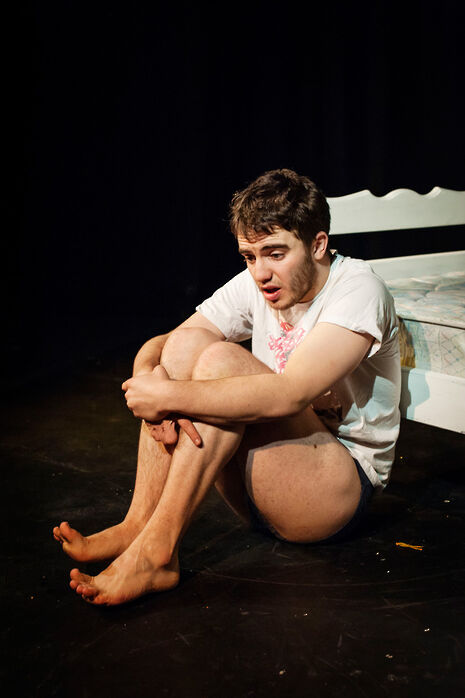Awkward Conversations with Animals I’ve Fucked
A fantastically acted, if not a little inconsistent, production of a very odd play

The title of this play is no mere euphemism, as the audience is placed face to face with Bobby, a serial performer of bestiality, in Rob Hayes’ controversial play.
It first must be said that there cannot be enough praise for Chris Born, the sole actor in this production. To learn what is essentially an hour-plus long monologue and perform it for five nights in a row is no mean feat – doing so whilst dressed solely in a Mr Messy t-shirt and rather tight Y-fronts for the vast majority of it certainly doesn’t make the job any easier.
Upon entering the Playroom, a pre-state of Bobby childishly fidgeting around a sparse, yet excellently minimalist set of a bed and a chest of drawers greets you. The first section of the play, a morning-after conversation with a dog, plunges the audience straight into Bobby’s surreal world, driving head on with taboo after taboo. Nervous giggles turn into full-on laughter as the audience begins to accept the situation and its twisted humour.
Born’s performance, especially given the daunting task of an hour-long play, is fantastic. His physicality, for which movement director Rose Reade must also be praised, is worth particular mention: from the pre-state to the final moment of the piece, Born has a constant nervous energy, with a certain moment involving the consideration of the use of peanut-butter a particular highlight.
Disappointingly however, the production lulls towards the middle after the initial novelty from the shock of bestiality and its associated puns die down. This seems to be a symptom not of the acting, but perhaps Emich’s direction, as Bobby begins to feel rather one note, relying too much on the awkward, nervous characterisation that was a highlight of the play’s beginning.
Though just as it begins to lose your attention, this production’s triumphant penultimate section arrives. Regaining the hilarity of the start, this scene involves primate prostitution and multiple euphemistic plugs, sockets and crayons. Born’s performance really peaks here where he – in spite of all the surrounding humour – hits a touchingly sober note.
The end of the play, whilst intended to be sentimental and perhaps even tragic, instead leaves the audience bewildered – there is a deep sense of, 'well, that was weird’. Whether this is down to the writing or direction, I’m not too sure, but it seems that Awkward Conversations certainly excels most in its comedic sections.
Technically, the use of a nausea-inducing strobe light during the transitions seems a little heavy handed, whilst the continuous placement of Bobby’s sexual partners in the Corpus corner could perhaps be changed to add a little more variation. However, these are but small gripes in what otherwise is a fantastically acted, if not a little inconsistent, production of a very odd play.
 Comment / Not all state schools are made equal 26 May 2025
Comment / Not all state schools are made equal 26 May 2025 Theatre / Why is there not a theatre studies course at Oxbridge?28 May 2025
Theatre / Why is there not a theatre studies course at Oxbridge?28 May 2025 News / Students clash with right-wing activist Charlie Kirk at Union20 May 2025
News / Students clash with right-wing activist Charlie Kirk at Union20 May 2025 News / Final Chancellorship candidates confirmed28 May 2025
News / Final Chancellorship candidates confirmed28 May 2025 Fashion / Degree-influenced dressing25 May 2025
Fashion / Degree-influenced dressing25 May 2025





